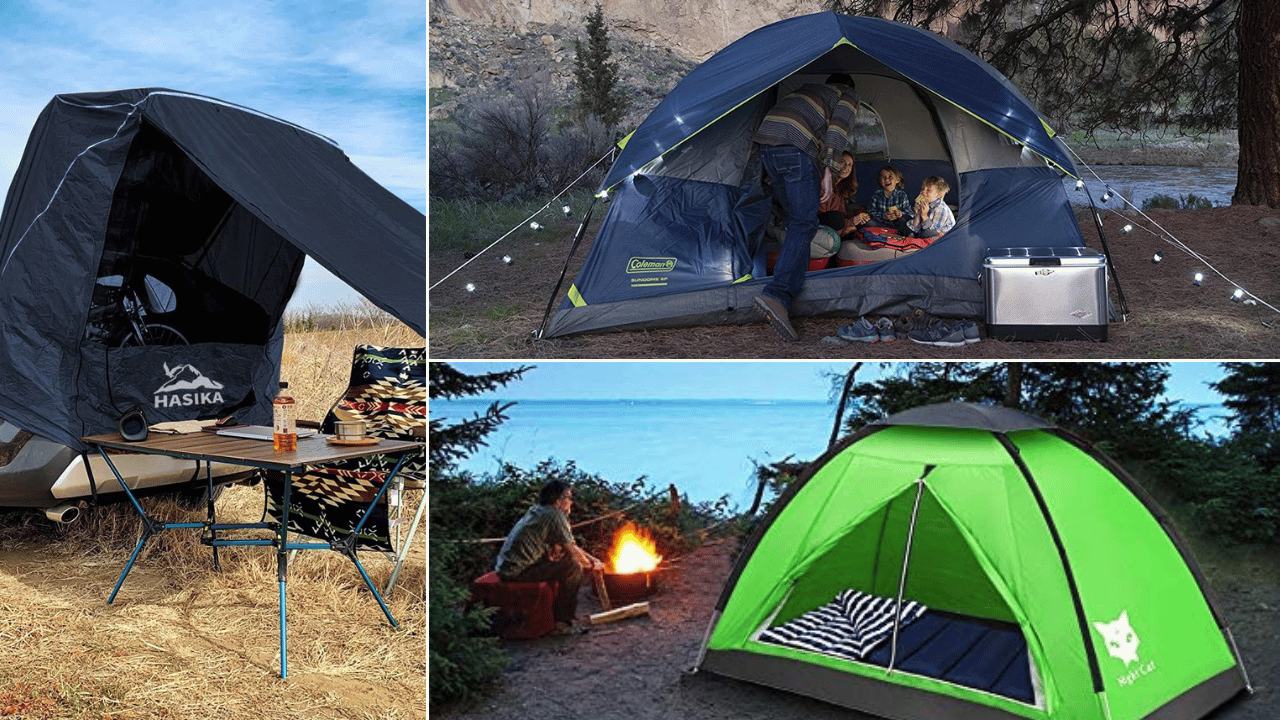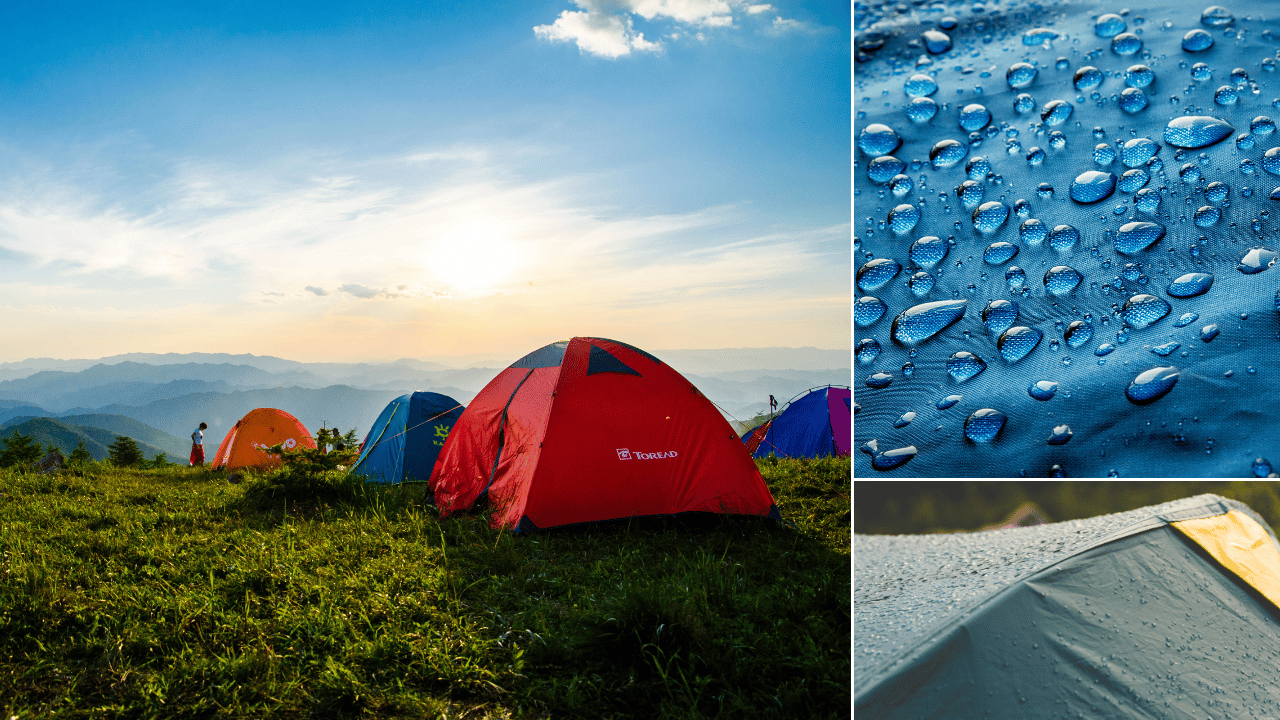Are Canvas Tents Waterproof? Everything You Need to Know
Learn if canvas tents are waterproof, their benefits, and how to maintain them. Discover why they're a durable and eco-friendly choice for camping.
When planning your next camping trip, choosing the right camping tent can make or break your outdoor experience. A common question among campers and outdoor enthusiasts is, “Are canvas tents waterproof?” The short answer is yes, but it’s not that simple.
Canvas tents, made primarily from cotton canvas, offer unique benefits like natural breathability and durability. But when it comes to staying dry during heavy rains or extended wet conditions, understanding the materials, treatments, and proper maintenance is essential.
Waterproofing treatments play a crucial role in making canvas tents waterproof. These treatments enhance the fabric's ability to repel water, ensuring you stay dry even in adverse weather conditions.
This guide dives deep into all things canvas tents, including their waterproof properties, key features, and tips to keep your tent in peak condition. By the end, you’ll have all the knowledge needed to choose and care for your canvas tent properly.
What is a Canvas Tent?
A canvas tent is a type of tent made from canvas material, which is a tightly woven fabric crafted from cotton or a cotton-polyester blend. Known for their durability, water resistance, and breathability, canvas tents have become a favorite among outdoor enthusiasts. These tents are versatile and can be used for various activities, including camping, glamping, and outdoor events. Available in a range of styles such as bell tents, wall tents, and cabin tents, canvas tents cater to different needs and preferences. The robust canvas material ensures that these tents can withstand the elements while providing a comfortable and breathable environment inside.
What Makes Canvas Tents Unique?
Canvas tents stand out from their synthetic counterparts like nylon or polyester tents due to their superior tent material. They’re made from canvas fabric, often cotton canvas, which is heavier but significantly more durable. Canvas material is widely praised for its natural breathability, ability to regulate temperature, and resistance to wear and tear. Additionally, the application of a waterproof coating enhances its durability and water resistance.
Types of Canvas Tents: Canvas Wall Tent
- Canvas Bell Tents
Canvas bell tents are a popular type of canvas camping tent featuring a simple design with a central pole and a spacious interior. The conical shape allows effective wind resistance and excellent airflow, making them ideal for family camping or car camping adventures. Additionally, their waterproof and breathable design ensures comfort in various weather conditions.
- Canvas Cabin Tents
Offering plenty of usable space with straight walls, cabin tents are perfect for large groups or family camping trips. Their design optimizes center pole placement and allows for optional features like wood-burning tent stoves.
- Canvas Wall Tents
Also known as outfitter tents, wall tents offer extended roominess with vertical walls and are often used in hunting or base camp setups. Many come equipped with stove jacks for cold-weather camping.
Canvas Bell Tents: A Popular Choice
Canvas bell tents are a standout type of canvas tent, recognized for their classic, bell-shaped design. These tents offer a spacious interior, making them ideal for family camping trips or luxury glamping experiences. The sturdy construction of canvas bell tents ensures they can handle various weather conditions, while their easy setup makes them a convenient option for outdoor events and festivals. Typically made from high-quality canvas material, these tents feature a waterproof and breathable design, ensuring comfort and protection from the elements. Their aesthetic appeal and practical benefits make canvas bell tents a popular choice among campers and glampers alike.
The Cotton Canvas Material Advantage
Unlike synthetic tents (nylon or polyester), canvas is made of tightly woven cotton fibers or cotton-poly blends. This tight weave naturally repels tiny water droplets but isn’t inherently waterproof. Canvas makes an excellent choice for long-term durability, but it requires proper care to maintain water protection over time. Double fill cotton canvas, made from twisted threads, enhances the tent’s durability and water resistance. The waterproofing process further enhances the water resistance of cotton canvas by applying a special coating that prevents water from penetrating the fabric.
Are Canvas Tents Waterproof? Understanding the Science
The primary distinction to make here is between a waterproof canvas tent and a water-resistant one. Straight out of the box, most canvas tents are water-resistant, meaning they can repel water to an extent, but they’re not fully impervious to heavy rain or extreme conditions without additional treatment.
Waterproofing treatments play a crucial role in enhancing the water resistance of canvas tents.
Why Canvas Tents Perform Well in Wet Conditions
Surface Tension and Tight Weave
The dense fabric of canvas camping tents creates surface tension, causing water to bead and roll off instead of seeping through tiny holes in the weave. This tight weave is a critical factor in resisting water penetration.
Natural Breathability
The waterproofing process of cotton canvas, combined with its unique ability to wick water, helps regulate interior moisture, preventing condensation buildup during cool, wet weather.
The Waterproofing Process
Canvas tents undergo a weathering or seasoning process to become fully waterproof. This process involves deliberately exposing the tent to water (such as a heavy mist or light rain). When wet, cotton fibers swell and close any small holes in the fabric, creating a waterproof barrier once dry.
In addition to this natural process, waterproofing treatments can be applied to further enhance the water resistance of canvas tents.
Tip: Always allow your canvas tent to dry completely after the weathering process or after getting wet during a trip. Failing to dry completely can lead to mold, mildew, or fabric degradation.
Tips for Enhancing Waterproofing
The waterproofing process is crucial in maintaining the waterproof properties of canvas tents, ensuring they remain effective in keeping you dry. Even quality canvas materials may benefit from added waterproofing to ensure your camping tents stay dry even during heavy rains or extended periods of wetness. Here’s how you can ensure your tent stays dry even during heavy rains or extended periods of wetness:
Use Waterproofing Treatments
- Apply a water-based solution designed for canvas tents, such as waterproofing treatments. Options include specialized sprays to enhance water repellency.
- Be sure to reapply treatments annually or as needed, especially if you’ve noticed diminished rain resistance.
Add a Rain Fly
While canvas is naturally water-resistant, a rain fly with a waterproof and breathable design adds extra protection during heavy rains or unpredictable weather. It catches water before it comes into direct contact with your tent.
Inspect Seams and Sealing
The seams of your tent are critical weak points. Ensure all seams are sealed tightly with seam sealant and waterproofing treatments to prevent leaks where fabric panels join together.
Pitch Correctly
Always pitch your tent on higher ground to avoid pooling water and ensure sufficient ventilation. Proper setup, as part of the waterproofing process, can minimize moisture accumulation and help your tent withstand sun damage during sunny days.
Buying a Waterproof Canvas Tent
When it comes to purchasing a waterproof canvas tent, several factors should be considered to ensure you make the right choice. First, look for a tent made from high-quality canvas material that is tightly woven and treated with a waterproof coating. This will ensure maximum water resistance and durability. Consider the size and style of the tent, keeping in mind the number of people it needs to accommodate and the type of camping or outdoor activities you plan to use it for. Additionally, evaluate the tent’s features, such as ventilation, ease of setup, and additional accessories like stove jacks for cold weather camping. Finally, consider the price and value of the tent, opting for a reputable brand that offers a warranty and excellent customer service. Investing in a quality waterproof canvas tent will provide you with reliable shelter and comfort for many camping trips to come.
How Canvas Tents Compare to Synthetic Tents
When it comes to choosing the right tent for your camping adventures, the debate between canvas and synthetic tents is a common one. Both have their strengths and weaknesses, making them suited for different types of campers and scenarios. While canvas camping tents are known for their durability, comfort, and eco-friendly materials, synthetic tents, often made from materials like nylon or polyester, offer their own unique benefits, such as being lightweight and quick-drying.
Canvas tents are often the go-to choice for campers who prioritize durability and long-term investment. The thick, natural material stands up well to wear and tear, making it ideal for extended camping trips or rough conditions. They also provide excellent insulation, keeping the interior cooler in the summer and warmer in colder weather. Furthermore, canvas tents are more environmentally friendly due to their natural waterproof coating and reduced reliance on synthetic materials.
On the other hand, synthetic tents are loved by those who prioritize convenience and portability. These tents are significantly lighter, making them easy to carry on long hikes or backpacking trips. They also dry quickly after rain, which is a huge plus in wet conditions. However, synthetic materials tend to break down faster over time and may not offer the same level of comfort as canvas tents.
Here’s how the two compare in a few key areas:
- Durability: Canvas tents are built to last, handling tough conditions with ease, while synthetic tents may wear out more quickly.
- Comfort: Canvas tents provide a more comfortable camping experience, with better temperature regulation and breathability compared to synthetic alternatives.
- Weight: Synthetic tents are much lighter, making them ideal for hikers and backpackers.
- Weather Resistance: While both types of tents can be waterproof, canvas tents have a natural waterproof coating, whereas synthetic tents rely on additional treatments.
- Eco-Friendliness: Canvas wins here, as it’s made from natural materials and is more sustainable than synthetics.
For campers seeking durability, comfort, and an eco-friendly choice, canvas camping tents remain the hands-down winner. However, for those needing portability and quick setup, synthetic tents are a practical and efficient option. The right pick ultimately depends on your camping style and priorities.
Environmental Sustainability
Canvas tents are an environmentally sustainable option compared to synthetic tents, as they are made from natural materials and are biodegradable. Canvas, often sourced from renewable cotton fibers, offers a greener alternative to synthetic fabrics that can contribute to microplastic pollution. Moreover, canvas tents can be repaired and reused, reducing waste and the need for new materials. When choosing a canvas tent, look for brands that prioritize environmental sustainability by using eco-friendly materials and manufacturing processes. By opting for a canvas tent, you not only enjoy a durable and comfortable camping experience but also contribute to a healthier planet.
Cold Weather Camping with Canvas Tents
Canvas tents are an excellent choice for cold weather camping due to their superior insulation and ability to withstand harsh conditions. When selecting a canvas tent for winter adventures, look for one specifically designed for cold weather, featuring a waterproof and breathable design. A sturdy frame and heavy-duty canvas material are essential to endure wind and snow. Additionally, consider tents with features like stove jacks, which allow for the use of wood-burning tent stoves to keep the interior warm. Pair your canvas tent with appropriate cold weather camping gear and clothing to ensure a comfortable and safe experience. With the right setup, canvas tents provide a cozy and reliable shelter, making winter camping enjoyable and memorable.
Maintenance for Longevity
Here are quick tips to keep your canvas tent waterproof and long-lasting:
- Clean Regularly: Dirt and grime can compromise water repellency. Use a damp cloth and mild soap to gently clean surfaces.
- Dry It Thoroughly: Always set your tent out to dry completely after use, even if it didn’t rain during the trip.
- Protect From UV Rays: Direct sunlight can weaken cotton fibers. Use a custom woven UV-resistant treatment to prolong fabric life.
- Store Properly: Pack your tent in a breathable bag rather than tightly sealed plastic to allow airflow and prevent moisture build-up.
Regular waterproofing treatments are essential to maintain the waterproof properties of canvas tents.
Why Canvas Tents Are Worth It for Camping Enthusiasts
Canvas camping tents might require more care, but their benefits significantly outweigh the effort required. With their natural breathability, durability, and waterproof and breathable design, canvas camping tents are ideal for family camping, car camping, or extended outdoor adventures.
It’s true that canvas material has vulnerabilities like sun damage and the need for waterproofing treatments. However, synthetic fabrics can’t match the overall comfort and eco-friendly properties of canvas. For campers seeking a quality experience with minimal discomfort, investing in a canvas tent is the way to go.
With the right setup and care, your canvas tent will provide years of reliable shelter and unforgettable outdoor experiences. Whether you’re heading out for family camping or setting up a cozy retreat with a canvas wall tent, staying dry and comfortable is entirely achievable.
Happy camping!







